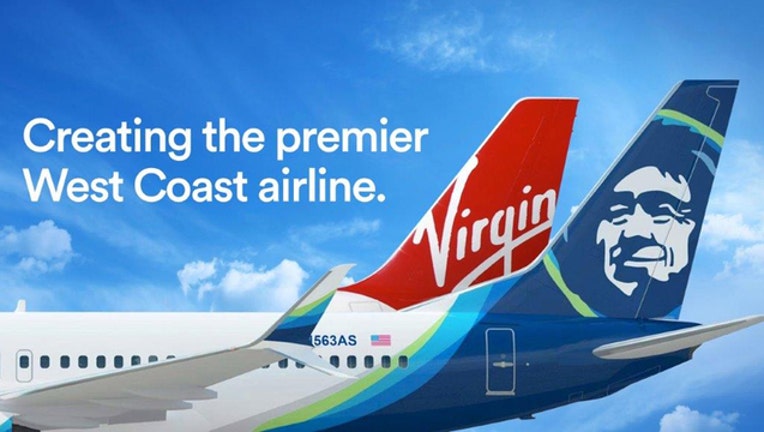Alaska Air buys Virgin America to expand West Coast flights

NEW YORK (AP) — Alaska Air Group Inc. is buying Virgin America in a deal worth $2.6 billion, making Alaska the biggest carrier on the West Coast and reigniting the debate over airline consolidation.
The proposed merger also would give Seattle-based Alaska a foothold in key airports in New York and Washington D.C., increasing the airline's appeal to business travelers.
"Our goal is to be the premier airline for people along the West Coast," Alaska CEO Brad Tilden told investors on a call Monday morning.
In Virgin's hometown of San Francisco, for instance, Alaska currently only flies to Seattle. Following the merger, it also would fly from San Francisco to several key markets including New York, Los Angeles, Las Vegas, Chicago, Boston, San Diego, Denver and Washington D.C.
The merger pushes Alaska ahead of JetBlue Airways — which had also bid for Virgin — to become the fifth largest carrier in the U.S. based on passengers. The combined airline would control 5.5 percent of domestic passengers, compared to New York-based JetBlue's 4.2 percent. By comparison, the four largest U.S. airlines — American Airlines, Delta Air Lines, Southwest Airlines and United Airlines — controlled a combined 83 percent of domestic seats in the past year, according to an AP analysis of data from Diio, an airline-schedule tracking service.
Alaska said the deal will add Virgin's 200 daily departures to its existing 1,000 daily flights. The airline currently serves 112 destinations in the U.S., Canada and Mexico.
Both airlines have very loyal followings in their respective hometowns. Virgin quickly won over passengers with its new jets, friendly crews, trendy mood lighting, extensive seatback entertainment systems, power outlets at every seat and meals on-demand. All of that could go away if Alaska choses to fly a uniform fleet, a decision company executives say they are still debating.
Alaska fliers are just as loyal, loving the airline's compassion. Like other carriers, it charges for bag fees but was the first to add a service guarantee: if a bag doesn't make it to the claim area within 20 minutes, fliers get $25 off a future trip or 2,500 bonus miles.
Virgin America's Elevate loyalty program members will become part of Alaska Air's Mileage Plan. The two loyalty programs will remain separate until the acquisition closes.
Virgin America got off the ground with support from minority owner Richard Branson and began flying in 2007. It went public in November 2014 with an initial stock offering priced at $23 per share. Virgin, which turned profitable — barely — in 2013, earned a record $340.5 million last year. The airline slowed down its rapid growth and got help from low fuel prices. Virgin is being forced to restart that growth this year as it takes delivery of new jets ordered years ago that can't easily be cancelled. New routes often start at a loss.
Alaska first approached Virgin about a sale in the fall and — pending approval by Virgin shareholders in June and by government regulators — hopes to close by the end of this year.
Alaska Airlines will pay $57 in cash per Virgin America share. That's a 47 percent premium to its Friday closing price of $38.90. Virgin's shares rose 40 percent in morning trading. The companies put the transaction's value at about $4 billion, including debt and capitalized aircraft operating leases.
The combined business will be based in Seattle with Tilden as its CEO. It will have about 280 aircraft including regional planes. Alaska has been a loyal Boeing customer for years, flying almost entirely a fleet of 737s, manufactured just a few miles from its headquarters. Virgin only uses Airbus jets.
The deal marks a shift in the size of consolidations within the airline industry. For more than a decade consolidation swept through the major players, reducing the largest nine carriers in 2005 to four airlines by the end of 2013. The Alaska buyout of Virgin indicates that consolidation has shifted to smaller players.
While Virgin has experienced growth in Dallas and added new service to Hawaii and Denver, the airline was having trouble getting enough takeoff and landing slots at busy New York airports, where access is restricted by government limits. Its smaller size and schedule made it difficult for the company to compete with bigger carriers for lucrative business travelers.
The deal is anticipated to add to adjusted earnings per share in the first full year, excluding integration costs, and boost annual revenues 27 percent to more than $7 billion. Alaska Air said that it expects about $300 million to $350 million in one-time integration costs.
Virgin America Inc.'s stock jumped 40.6 percent Monday morning, to $54.70. Alaska Air Group Inc., shares fell 4.5 percent, to $78.36.
__
Koenig reported from Dallas.
__
David Koenig can be followed at http://twitter.com/airlinewriter and his work found at http://bigstory.ap.org/content/david-koenig . Follow Scott Mayerowitz at twitter.com/GlobeTrotScott. His work can be found at http://bigstory.ap.org/content/scott-mayerowitz .
__
This story has been corrected to show that Alaska Air currently serves 112 destinations, not 90.

